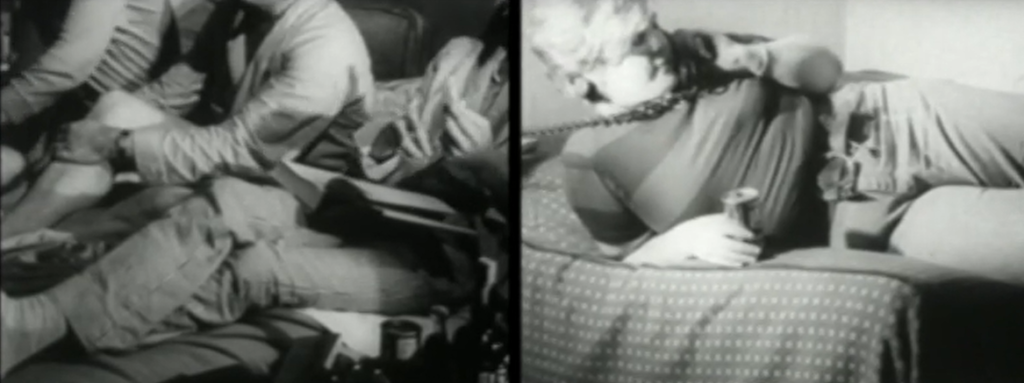|
Genres, Themes, Actors, and Directors:
- Documentary
- Paul Morrissey Films
Review:
Andy Warhol’s experimental split-screen film — with two video “narratives” but just one audio stream running at all times — was (according to Wikipedia) his “first major commercial success after a long line of avant-garde art films (both feature-length and short).” Here is a little more context on Warhol’s vision:
Once principal photography wrapped, Warhol and co-director Paul Morrissey selected the 12 most striking vignettes they had filmed and then projected them side by side to create a visual juxtaposition of both contrasting images and divergent content (the so-called “white” or light and innocent aspects of life against the “black” or darker, more disturbing aspects.) As a result, the 6.5 hour running time was essentially cut in half, to 3 hours and 15 minutes. However, part of Warhol’s concept for the film was that it would be unlike watching a regular movie because the two projectors could never achieve exact synchronization from viewing to viewing; therefore, despite specific instructions of where individual sequences would be played during the running time, each viewing of the film would, in essence, be an entirely different experience.
Such a precise goal is now moot given the film’s availability on DVD, but one could still argue that the constant attempt to shift views between either side of the screen induces Warhol’s desired differential effect. (Indeed, it’s fairly exhausting enduring this film — more on that below.)
Appearing as themselves at various times are, among others, Nico (who actually bookends the film):


… Mary Woronov and Ingrid Superstar:

… Eric Emerson:

… Brigid Berlin:

… and International Velvet.

(How may of these names and faces will be familiar to and/or relevant to younger film fanatics is debatable; the only clear stand-out is Woronov, given her starring roles in other GFTFF-listed titles — mostly notably Eating Raoul.)
I dare you to attempt one or more of the following (I succeeded in none):
- Watch this film without fast-forwarding.
- Watch this film without almost falling asleep.
- Watch this film without checking how much more time is left until it’s over.
- Watch this film in precisely one sitting.
To that final point, this is most definitely the kind of experimental movie that is best placed in an art museum, where viewers can come and go at will; indeed, I can easily see myself being drawn in for part of it, and staying a little longer due to wondering what might come next. But sitting and watching it all in one go simply isn’t tenable. After all, as Stephen Koch wrote in his review for Art Forum:
… The Chelsea Girls does not imagine time. It attaches itself to literal time, and by drawing it into a context of total disjunction, confounds the sense of duration under the suzerainty of the steadily ticking clock. True, like a conventional feature, it concerns itself with the relation between time and event, but it presents both in a state of radical dissociation, a structured but irresolvable disarray in which the life of narrative is disjoined and made a function of the machine.
Exactly.
Notable Performances, Qualities, and Moments:
Whatever floats your boat!
Must See?
Nope. Listed as a film with Historical Importance in the back of Peary’s book.
Links:
|







One thought on “Chelsea Girls (1966)”
Skip it. SKIP IT!!!
When I finally saw this years ago, I had known about its ‘notorious’ nature for a long time. But at that time it was also notoriously hard-to-find and hard-to-see. There was no
video availability.
I had returned to living in NYC again after a decade of living in Tokyo. An art museum scheduled some screenings so it was going to be shown as intended, with the ‘proper’ projection. It took some doing to get to the museum by subway; it wasn’t in Manhattan-proper but just outside. I remember the place was packed; naturally there was some snob-appeal to the event.
It was a COLOSSAL bore – that seemed endless; not even salvaged by any kind of camp value.